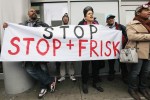It doesn’t take more than looking at our own backyards, at our friends and family, to quickly be inspired to tell a story. And then there are times of searing serendipity when we’re reminded that what’s happening in our own backyards is a reflection of a larger reality. Inspired by the tragic death of Trayvon Martin, African-American and Puerto Rican filmmaker Reinaldo Marcus Green was compelled to pick up his laptop and write his Sundance-selected short film Stop.
“Stop was born out of these tragic events. It was made to address injustices within our communities and what we can do about them. I wanted to create a scenario where ‘it could’ve been you’ so that for just a moment we could all relate to what happens to this young man as he’s walking home from practice,” Green told Remezcla.
It’s a fictional story that’s informed by his own experience, “I grew up Puerto Rican and black in NYC. We grew up understanding that we were different, that we would be treated differently, that we had to act differently, and that at night we were potential threats or targets just because of the color of our skin.”
The film begins with Xavier as he heads home after baseball practice. As he walks the darkened New York City streets, a police patrol car pulls up next to him and decides to go through his belongings. The encounter is full of tension as we wait to discover what the officers will find. In our own minds tiptoeing along the edge of judgment, aware of the latent or perhaps not-so-latent stereotypes that fester inside us about this young man who happens to be black.


Shot mostly with available light and a handheld camera, Stop is a detailed look at the inhumanity of racial profiling. The short was filmed throughout Red Hook, Brooklyn, and in the real-life apartments of cast members who participated in the film. The treatment is simple but the effect substantial.
“There’s a real systemic, institutional problem that goes beyond good cop and bad cop, black or white.”
Green’s intent was to stimulate a discussion about racial profiling and stop-and-frisk policing without proscribing a solution. “I made Stop to pose a question to audiences, not necessarily to give a definitive answer. It was never about telling someone what’s right or wrong, it’s about having people see for themselves and come up with their own conclusions.” He sees these discussions as being a predecessor to real change, “To me, that’s the best way for any meaningful change to occur — when it engages human beings in discussions and dialogue.”
He wants audiences to think for themselves but personally, Green sees the issue as much bigger than just a law enforcement problem. “I grew up around cops. I played baseball for coaches that were cops, with sons and daughters of cops, with brothers and sisters of cops, and have lived in blue collar cop communities. My father worked with law-enforcement, as an attorney for the NYC Department of Investigation, where he had to carry a weapon. It’s something I grew up with and around, it’s part of the fabric of who I am. A lot of my friends are cops. That said, I think there is something deeply troubling about where we are as a nation and there’s no secret that there’s a real systemic, institutional problem that goes beyond good cop and bad cop, black or white. I made my film Stop to get at the core of those issues, which could speak to both victim and perpetrator.”

While Green’s motivation for Stop came as a result of Trayvon Martin’s death in 2012, the most recent killings of Philando Castile in Minnesota and Alton Sterling in Louisiana have brought the topic to the forefront once again. “I hope that the tragedies of the last 36 hours can open up dialogue that can lead to effective change, by helping to rebuild communities, create safer practices and better policing, and continue to break down barriers that continue to divide this country,” Green lamented.
The writer-director has faith that his short film can help heal those wounds and push people towards action. “Stop will hopefully open minds, and open hearts, and see that we can create a better future for our communities if we all took a moment to think, reflect, and then act — again, thoughtfully and responsibly.”
Hit play on the video up top to stream the short film Stop in its entirety.
Additional reporting by Vanessa Erazo.




